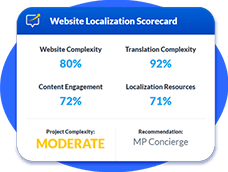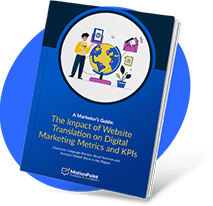Video  Jan 23, 2025
Jan 23, 2025
Discussing Canada’s Bill 96 – with Charles Lesperance
Welcome to three questions with MotionPoint. I'm your host, Dominic Ditherbide, and I have the absolute pleasure of being with Charles Nesbence, CEO of OXO Translations.
OXO Translations is a Montreal based translation company that uses its in house team of more than forty professional translators and their vast network of dedicated hardworking linguists to help their customers and clients translate content for global markets as well as the French Canadian market. Charles, how are you doing today?
I'm doing great. What about you, Dominique? I'm happy to be here with you.
And Yeah.
No. I'm doing great too. I'm happy to be here with you too, and, I I appreciate you hopping on. So I don't know if you wanna add a little bit more context to to to also translations and and the presentation of you.
Sure. So, I’m the CEO and founder of, OXO, Translation.
We are as you said, we are Montreal based. We have about a hundred employees.
Seventy five percent of our workforce and our employees are based in Montreal, Quebec, where I’m currently.
And, yeah, I founded the company ten years ago. We are we we are specialized in multiple verticals, but, overall, we are here to promote as well the quality of the translations in the Canadian market, and, hopefully, we can grow the business in the next years.
Awesome. Well, of course, you will. And I think it's it's very interesting the timing of our conversation because today we wanted to talk a little bit about, you know, Bill ninety six and the impact that Bill ninety six has had in terms of localization efforts within Canada.
And Charles Charles, I mean, your your last name, Lesperance. Right? Are you French Canadian yourself? Are you from the Quebecan area?
Yes. Born and raised, in Montreal, Quebec.
My first language, as you can probably hear, is French. So, I went I went to school in French, like, more than, I think, six to seventy percent of the the Montrealers and even more that in Quebec. Our first language is French.
Yeah. I mean and so this is a a a topic that's very close to you that you've lived, that you've experienced. So, I mean, Bill ninety six is just a reflection, right, of what society and what Canadians think about French Canadian as part of their culture and their heritage and the way business and, you know, society has to operate within the context of, of their citizens and in those languages. Right? So tell us, like, what has what has been the impact of bill ninety six that you've been seeing, not only at a personal level, right, but also for OXO translations in the past few months?
So, basically, what bill ninety six aim at is to preserve the French language in Quebec, and, we have the almost same law for the Canadian, at the Canada level as well. So the goal is that to make sure that the consumers can read and understand the message that the brands are are are are trying to convey. So everything so the the the base that everything, must be, in translated or written into into French. So employments contract, terms of conditions, marketing material for the companies.
We had a law before, that had, similar expectations for for companies, but bill ninety six, make it even broader.
So every company that with more than twenty five employees will need to have, all its material into French.
So as you can imagine, it should increase the volume, for French Canadian.
That’s a lot of people.
That's a lot of companies. That's a lot of people. Yes. So, so it put up, we can say, obligation for the companies to have the material ready, into French.
And if a company doesn't want to do this, there is, stricter measures to ensure that companies comply with, with this law. So but the government knew that for some companies, let's say, telecoms, banks, transport companies. You can imagine with a hundred thousand employees, there's a lot of material that is not, in French already. So they give, more time to to do it.
It's not like tomorrow, you need to have everything ready. They understand that there's thousands of documents to be translated. So, they give time, and, we can advise our clients on what kind of documents needs to be in French first and what are the we can schedule the documents as the delivery of of translations in that, in that sense.
Yeah. But, at the end of the day, it probably is in the company's best interest to accelerate how fast they translate. Right? Because at the end of the day, the fact that bill ninety six exists is because people want to read in in French and have information in French.
So, you know, specifically, what are some of the key benefits that companies would gain by embracing this localization? Because even though that it's a law and there's a regulation of behind it, there's still, like, a consequence that's positive for businesses that translate. Right? They would get more engagement from the French Canadian market.
You you gain more authority, reliability from from from your cons your your target customers, etcetera. So what what do you think about that?
Totally. So I would divide, because we we around seventy five percent of our of our revenues is into French. We're really into that market.
So if we talk more specifically into this kind of, the English to French Canadian translation, the we we more and more companies understand that because around twenty five, thirty percent of, the Canadians speaks French primarily, you need to address, even though we are bilingual or more or less bilingual, we understand that it’s very important for us because where we come from to have the message written almost like if it’s, written in French.
Right. So you want to sell, shoes. You need to have really, really, like, the message, the the the the tagline. It's it's a it it's just creation what consumers expect.
As well, so so for them, it’s it’s core to the marketing functions.
We often work hand in hand with the marketing teams to come with slogans that are really, really, sounds, native. So it it goes beyond translation. And I think brands now really understand, the need for that. And there have been cases, where, brands didn't take localization seriously.
And in backlash, you can have, we won't name name companies there, but there was big backlash around some campaigns that were too literal. And probably it's because LSP were not involved, at first. You know, you have a market marketing, person that can speak French or understand, you use Russian translation, and some sometimes without context, it could be tricky. So I think LSPs have this, really, understanding, experience, capacities to, work and in hand with the clients that want to be present in this market.
And, overall, if you go a bit beyond French Canadian, because most of us, companies, we we, we translate into multiple languages. There's expectations of quality is present for or the German translation, Spanish, because they have this experience with French Canadian translations, and they especially so high. So they applied that similarly to, all the other languages that we do. So, yeah, I think in Canada, we can con be considered like the Swiss chocolates and that we the high end.
This is, I think, for all the LSPs in Canada, we are viewed as high end, LSPs.
And, yes. So I think this is a bit where the market is currently in Canada and how we help, different organizations in in there.
Yeah. It's it's it's specifically in Canada, I think, it's you know what's very funny, Charles, is how sometimes when you're when when when you're somebody that knows another language, you know, and we were talking about this earlier, how I speak Spanish, born and raised in Mexico. You you were born and raised, you know, in in in Quebec, Canada, speaking French Canadian. Sometimes when they when we see a translation and it's not transcreated or or or really you can tell the the original marketing was in English, because you know a little bit of English, there's still that taste of insincerity, I guess, that might come up or you might think about, oh, well, this wasn't designed for me. You know? And and I think it's very curious because a lot of times, companies think about translation for global markets.
Mhmm. But actually, where translation quality can be perceived the easiest is when you translate content for secondary markets within your main market. So let's say Canada has a lot of speakers.
One one of the secondary markets within that or maybe not secondary, but submarkets or subpopulations within that Small or medium.
Canadian speakers.
But they speak a lot of English too. So when you're they they are witnessing the translations made for them, they have a different sense of translation quality.
And, that happens a lot in in the United States of America for Spanish translations.
And it’s interesting because a lot of Spanish translations Mhmm.
Are are very hard to interpret because you got people from all over the world and all over, you know, South America, Europe, that has different, like, flavor of the Spanish. So you got a lot of, you know, let's say, possibility of, you know, entropy or or just a little bit of discussion and and disagreement on translation quality, which at the end is always gonna be very subjective to the reader. So, French Canadian specifically is an example of a language that that translation quality really matters and is gonna be easily recognized by the end user.
And I think that’s just interesting, you know, because it’s it’s different than than the global market translation when when you transfer for a secondary market.
Totally. It it goes a bit with the buy local I mean, even if you're a good global company, I think consumers want to feel that you're there. It's not just, okay, you translate and then you buy the product. It's that you are in the market. You understand the consumers.
Exactly.
Yeah. Yeah.
So, so we really leave that every day. Yeah.
Oh, yeah. Well, I was just gonna go on for to our last question here is, I don't know. Can you share a success story, maybe a case study that highlights how for example, maybe OXO translations helped somebody specifically and how it impacted their business growth specifically again for for Canada and French Canadian market.
Yes. Totally. So, one example that I find really can illustrate that is, we are working with coffee global coffee brand, really, with a big presence in Canada. And, we're working really hand in hand with our marketing team to come with concepts as well.
So, for example, this company has, a special, program or or, you know, for holidays, for example. So Mhmm. For Canada Day, they will have a promotion with maybe a special menu and, a lot of branding around that. So come celebrate Canada Day.
And, in Quebec, Canada Day is important, but the the the most important or celebrated event is Quebec Day, which is, the La La La Feltier. So it's, one week before Canada Day. So we came with their marketing team and a in house, team as well with a concept that will have actually a menu into, French for that day, with different branding as well. So Mhmm.
It’s localization, I think, three point zero or something, but we like, we need to come with a concept because if it’s only Canada Day, okay, you’re gonna have some people show up.
But if it’s, really, localized for this special Right.
Thing, it it will work. And probably this old lot of lot of, food that day. And, it's it's, it's all these little things, I think, that make brands here in Quebec succeed is, it's the little thing that's the customer is gonna say, wow. They they have a team in Quebec of marketing. And, so we can advise their clients on on this, I think. I think most of us in the SPS are, in Canada are playing that role as well.
Is it Munich? I don’t know, but this is one example I I I found.
Well, thank you, Charles. So I appreciate your time. That does it for three questions in MotionPoint, and I hope to see you again and to have you again, Charles, but appreciate your time. Thank you very much.
Thank you, Dominic. It was a pleasure.
Categorieën: Websitevertaling, marketeer, activiteiten stroomlijnen, prestaties optimaliseren, video





Delen: